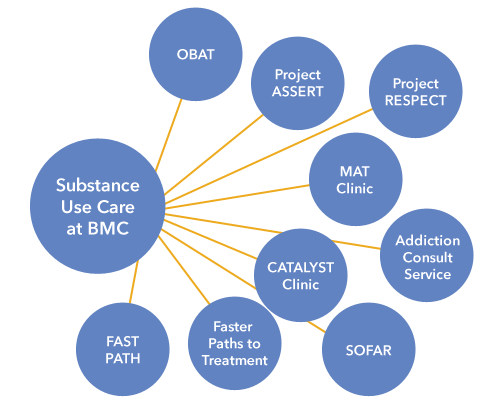The problem likewise pertains to how the brain, when denied of the drugs to which it is accustomed, reacts to stress. The reaction is generally exaggerated negative emotion, and even despair. In this setting, the strong association of found out ecological hints (for instance, smelling beer at a ballgame or seeing the corner where the dealership can be discovered) Mental Health Doctor worsens the craving for the compound.
The brain science behind these observed and quantifiable processes in dependency assists to clarify the goals of treatment. Agonist medications (such as methadone and buprenorphine) can stabilize the craving brain while the preparation and thinking procedures get back in shape. But how can an individual with addiction avoid the cues that set off yearning? How can they reliably get assist? It is insufficient simply to "simply say no." The person needs to develop alternative sources of pleasure and reward, and people who have actually been separating themselves in order to consume or use drugs without inhibition might need to operate in a purposeful method to re-acquire regular "pleasure" social interactions, physical enjoyments like a swim or a bike trip, and other healthy, satisfying benefits.

Plainly, there are people on the mild end of the spectrum who have the ability to choose to stop or cut down. For these people, when the rewards of not utilizing outweigh those of using, they stop. Some people with a pattern of unhealthy drug or alcohol use that meets requirements for a diagnosis of substance usage disorder might likewise "mature" out of it without formal treatment.
I wish for my clients that understanding that there is biology somewhere down deep in these problematic and typically dangerous habits can alleviate the self-loathing and regret that is nearly universal amongst individuals with dependency. And to comprehend that it might even go deeper, to the genes and experiences over which they had no control, might likewise assist.
And when we get proficient at it, maybe, just maybe, we can start to have the option to live a life that is appropriate and even much better than we 'd imagined. Commenting has actually been closed for this post.
Drug addiction, in the easiest terms is the strong obsession to get and utilize substances, even though a number of undesirable and dangerous consequences are likely to occur. Dependency has actually been referred to as a "medical condition that affects the brain and changes habits." Different substances including alcohol, illegal drugs, prescription medications, and even some non-prescription medicines might sustain the development of an addiction.
The Definitive Guide for How Does Drug Addiction Start
The meaning of addiction differs among individuals, organizations, and doctor, and society's perspectives about dependency are ever-evolving. The National Institute on Drug Abuse (NIDA), the Substance Abuse and Mental Health Services Administration (SAMHSA), and the National Institutes of Health (NIH) all likewise describe addiction as a long-term and relapsing condition defined by the private compulsively seeking and using drugs despite unfavorable consequences.

These modifications are long-term and can persist well after the person has stopped using drugs. Comparing compound addiction to heart illness may help illustrate why it is defined as an illness by many:1 Both addiction and heart illness disturb the routine functioning of an organ in the body the heart for heart problem and the brain for addiction.
Addiction and numerous types of cardiovascular disease are largely avoidable by engaging in a healthy lifestyle and avoiding poor choices. They are both treatable to avoid additional damage. AAC is in-network with numerous insurance coverage business. Your dependency treatment could be free depending on your policy and deductible. Moreover, considering that addiction is marked by periods of recovery and sign recurrence (relapse), it looks like other diseases like hypertension and type-2 diabetes. These illness are lifelong conditions that require continual effort to handle.
3 The concept that substance addiction is an illness is not, nevertheless, universal. Some would argue that dependency is not an illness due to the fact that: Dependency is not transmissible or infectious. Addiction is not autoimmune, hereditary, or degenerative. Addiction is self-acquired, indicating the individual offers the condition to himself. Proponents of this method of believing put much more emphasis on the social and ecological elements of addictionone proponent claims that dependencies might be "treated" by locking addicts in a cell where there is no access to substancesinstead of on the brain modifications that happen as an outcome of drug abuse.
For example, it is real that most drug abuse starts with a choice (although in a lot of cases compound usage began with a prescription from a doctor for a real medical issue and evolved into abuse). However while nobody required an addicted person to begin misusing a substance, it's difficult to imagine somebody would willingly destroy their health, relationships, and other significant areas of their lives.
It should be kept in mind that the "addiction is an option" view is mainly relegated to people and small groups. There are couple of, if any, nationally acknowledged compound abuse-focused companies whose views have not progressed to comprehending dependency as a disorder or disease. In truth, the NIH sees the idea that addiction is an ethical failing as a dated, ill-informed antique of the past. The American Psychiatric Association (APA) no longer utilizes "dependency" as a term or diagnosis.
All About Who Drug Addiction Definition
7 No matter how one defines dependency or what term is used, what is clear is that addiction is a massive problem in the U.S. that impacts millions. Another irrefutable reality is that lots of drugsboth illegal and prescriptionare rather addictive. Individuals get addicted to drugs for numerous reasons, but among the major elements behind why drugs are so addicting is the gratifying, blissful high they bring about.
1 Every individual experiences natural rewards in their life like a scrumptious meal, a favorite tune, the pleasant feeling following workout, or the joy after sex, but drugs provide something more. The high that originates from abusing drugs is bigger, brighter, louder, and more satisfying than any natural reward, and it can make natural benefits appear small, dim, and peaceful by comparison.
Trigger the release of brain chemicals in big amounts. what does drug addiction mean. Avoid brain chemicals from being recycled and reabsorbed into the brain. One of the brain chemicals frequently discussed in the addictive power of compounds is dopamine. 1 Scientists believe, when a rewarding occasion occurs, the brain launches dopamine to signal the experience and motivate repeating.
Dopamine tells the brain that the experience Addiction Treatment Facility of using a drug is necessary and must be repeated (why drug addiction is a disease). The brain is set to keep in mind the people, locations, and things associated with the usage, so it will be easier for the individual to duplicate the situation. With repetition, these bursts of dopamine tell the brain to worth drugs more than natural rewards, and the brain adjusts so that the reward circuit becomes less sensitive to natural benefits.
1 If natural rewards are a plate of broccoli, drugs are a big bowl of ice cream, and broccoli is even less appetizing after ice cream. With time, the desire for drugs ends up being a learned reflexa individual can be activated to use by the people, locations, and things that are linked to their drug use, simply as somebody may get hungry driving by their preferred restaurant, just the desire is likely to be far more frustrating.